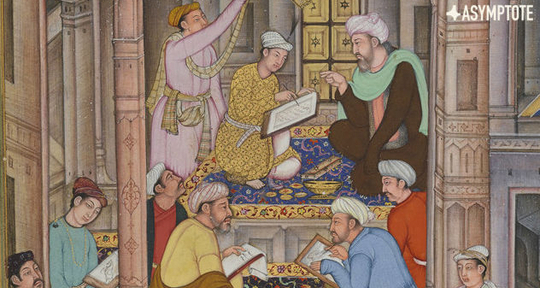Andrea Marcolongo’s motivation for writing The Ingenious Language is refreshingly straightforward: the Italian writer, translator, and classical scholar wants everyone to fall in love with ancient Greek. Casting aside the rigid pedagogical practices and elitism traditionally associated with classical studies, Marcolongo focuses on the personal, exploring the “extraordinary” challenges, ecstasies, and opportunities ancient Greek offers to all who engage with it. Written for “those who have never studied it and are curious, those who have studied Greek and forgotten it, those who have studied it and hated it, and those who are studying Greek literature in school today,” The Ingenious Language is a bestseller in Italy and, in translation, has been embraced by readers around the world. Masterfully translated from the Italian by Will Schutt and published by Europa Editions, Andrea Marcolongo’s love letter to ancient Greek is now finally available in North America. To celebrate, Asymptote spoke with Marcolongo about falling in love with an ancient language, the “strange” appeal of studying Greek, the myth of Greek color blindness, and the need for a common utopia.
—Sarah Timmer Harvey
Sarah Timmer Harvey (STH): In the introduction to The Ingenious Language, you mention “falling in love” with ancient Greek as a young girl. Can you tell me why Greek was so appealing to you, why you fell in love?
Andrea Marcolongo (AM): I always say that the love story with Greek is the longest of my life. However, it wasn’t love at first sight: I don’t believe in that. Instead, it was a path of knowledge. I remember myself as a young girl waiting for the yellow bus to go to high school with a big Greek dictionary in my hands. It was a challenge, first of all, to learn an alphabet that I didn’t know, and then a challenge to myself, my openness to the world.
Obviously, every language is “ingenious” in its own way because it expresses thinking of those who use it every day. The adjective “ingenious” which gives the title to my book derives from three different languages: the Greek, where it comes from the verb root “to create” and means, as in Aristophanes, “creative mind,” the Latin, in which it refers to the “genium” which, according to mythology, is a small being that accompanied man throughout the course of life to make him happy, and then the French, in which “génial” means fun, or beautiful. I played with these same words in three different languages as a way of explaining why I, Andrea, a thirty-year-old woman, love Greek. I love it because it is a free and human language. Free, because its quirks—maybe even those that drove us crazy at school—were not made obligatory by grammar, but left to the free choice of those who used Greek daily to speak and write. It is, therefore, a human language because it leaves people the responsibility of choosing not only what to say, but also how to say it. And in doing so, Greek also allows the speaker the freedom to express who they are. READ MORE…


